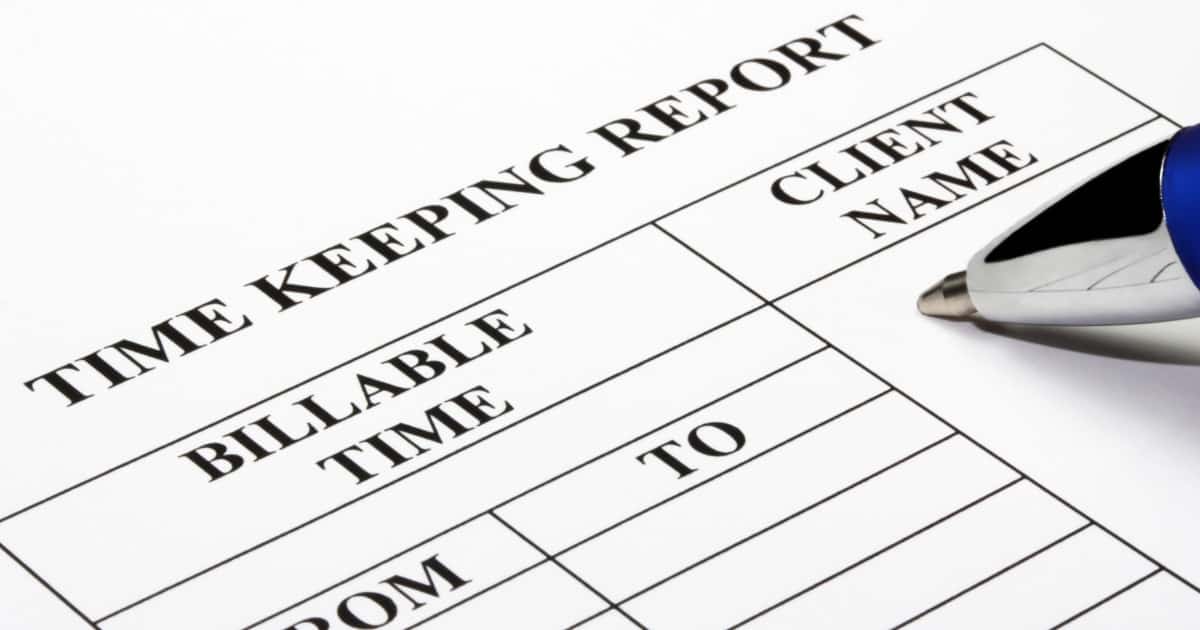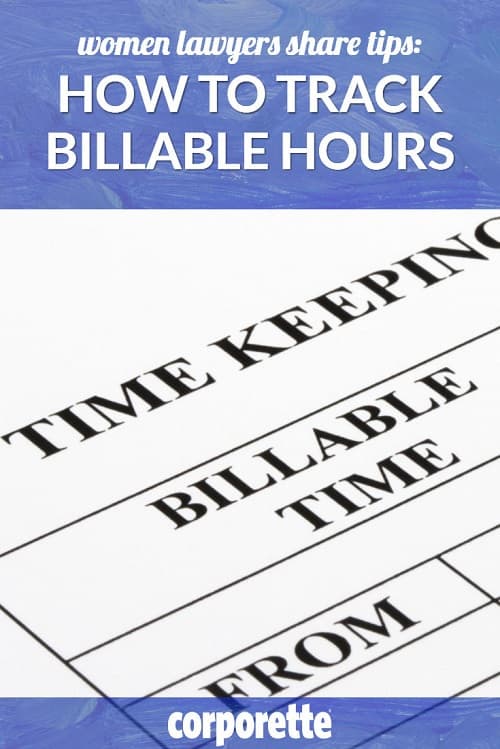How to Track Billable Hours: Tips, Tricks, and Best Practices
This post may contain affiliate links and Corporette® may earn commissions for purchases made through links in this post. As an Amazon Associate, I earn from qualifying purchases.

This question is for the lawyers and others who have to keep track of your time — what are your best tips and tricks on how to keep track of billable hours? If you're a lawyer who reviews time sheets (either at a firm or in house), we'd love to hear your thoughts on what's acceptable, what's NOT acceptable, and what's a red flag for you… It's been a while since we've discussed time management (particularly how to manage your time for billables!), so let's ponder…
Here's Reader C's question:
I thought it might be fun to do a post about all things billing. For newer attorneys, or those interested in transitioning from gov't/etc., it could be really useful to learn the general rules and what more senior attorneys look for on their bills. For others it would be interesting to see tips/tricks for billing, key terms, billing as a way to market to clients and other related things. (E.g., my firm sends out a billing insert of a short article with each month's bills).
Great question, Reader C! In my experience people tend to fall into two categories here: the obsessive billers who keep track in 6- or 10-minute increments — and the people who will definitely, totally get you those timesheets from six months ago asap. (We're right on top of it, Rose!)
The more cases and billable matters you have to keep track of, the more you have to be the first, obsessive person — whereas if you're stuck on one never-ending project (doc review, anyone?) you can swing towards the second end of the spectrum.
{related: our best executive functioning tips and tricks}
I'd love to hear your thoughts, though, readers — what are your best tips on how to keep track of billable hours? Does your company use any apps — or do you just have a notepad? How many hours do you find that you have to WORK to BILL 8 hours a day?
What are your billable requirements — and have you ever done things like double billing (where, say, you take a flight for one client and bill it to them, but when you're on the plane work on a second client's matter and bill them as well?)? (Which, as readers note in the comments, is highly discouraged from an ethical perspective…) Where are the limits for you — if you spend ten minutes on the elliptical thinking about a client's issue, would you bill it?
As we noted in our last post on managing your time with billables:
- Avoid email and the Internet.
- Check and see how often your computer is “fetching” new emails.
- Choose set times to look at (and respond) to email throughout the day.
- Adopt a system to keep your inbox clear of clutter.
- Reassess the usefulness of online chatting services.
- Use a time tracker
- Set a timer.
- Look for the bottlenecks in your time.
- Know where you are in meeting your billable targets (such as with this spreadsheet!)
Psst: you may also want to check out our most recent discussion on how to manage your time, as well as our recommendation for a billable hour spreadsheet to help you estimate where you are in target hours for the year.
Pictured: Deposit Photos / ziss26.
Related: Here are six great books on productivity!
Some of our latest favorite books on productivity, below:









I use a free software called Manic Time to track everything I do on my computer during the workday. It lets me back out the not work-related stuff and helps me figure out how long I really did spend writing that complaint. I do a lot of PI work and have 30+ cases at any point in time so I am constantly interrupted and switching from task to task. It’s impossible to do billing entries as I go. Every time I get off the phone or out of a internal meeting I shoot myself an email with who it was with and for how long. I have my email set up to bcc me on everything. I recreate my time twice a month using my emails and my manic time software.
Back in my defense days when I had 5 clients I would work on one task for hours and just bill in real time. On the defense side there was no block billing. Even though I do some defense now, it is not insurance defense so I can get away with billing three tasks that took a total of 2 hours without breaking up how much time I spent on each of them.
I try to make sure my time entries always have function and value – what I did and why I did it. So instead of teleconference with opposing counsel it is teleconference with opposing counsel to discuss settlement possibilities. Also, the insurance companies had computer software that initially reviewed our bills and flagged certain words. We learned to use different words. Instead of draft it was prepare for example.
I long for the day I can give up billable hours for good.
Can you give examples of the words it flagged?
Insurance companies sending back the bills is the WORST. I spent so much non-billable time going back through my time sheets, having to explain in “more detail” or with the correct words what I was doing.
Best tip? Record it as you go. Seriously. As soon as a task is done (email sent, phone hung up, draft sent off for review) I record it in my billing software. If I do more later, I revise later that day. I cannot imagine having to “recreate” my time at this point after getting in this habit.
And no, you cannot bill for time “thinking about a case while on the elliptical.” I sure hope anyone who says that isn’t my associate…
I do this too and I’m so used to it now, I could never go back to taking notes and reconstructing it later. My firm recently switched over to a program where you can keep a timer running for a billing entry. I always have a timer running unless it’s something like a meeting or call with set begin and end times. If I flip over to a personal task, it’s one click to turn the timer off; back to work, the timer goes back on again. Before we had this program, I used to do essentially the same thing in Excel by setting up a spreadsheet with begin/end times and using keyboard shortcuts to just stamp in the current time.
Do you have a large case load? How do you handle a call that comes in while you are in a task and then an email that you have to respond to when you get off the call, all on 3 different matters? On my software, if I just stopped the timer and opened a new one (in the phone call scenario) and then went back to the drafting of a document, it would enter the before and after the phone call times as separate time entries. Since I might get interrupted 10 times while drafting one document, I don’t want 10 different time entries in one day for one task.
Yes. I have close to 80 open matters that I am handling/monitoring and end up with 30-35 time entries each day generally. It’s doable. You just have to be disciplined.
Yes, although not as many open matters as Anonymous at 3:35– it’s more like ten. Our software allows you to start and stop a timer but keep it all as one entry, which is a big plus. Before we had this software and I was using Excel, I would create a new row for each individual timer session and then have my assistant combine them when entering my time.
Same. Usually if I know what I’ll be working on that day, I’ll create time entries (with 0.0 hrs to start) for those matters, but it’s pretty easy to close out of an entry and open a new one if an unexpected call comes in, etc. When the call is done, I’ll tag that time entry (if I haven’t already done it while talking), close it, open whatever I was doing before, and click the start button. It has made my life so. much. easier.
Interesting. Maybe I’ll mess around with the software some more and give it a try.
Is this Carpe Diem or a different software? I had that back in the day at my old firm, and current firm’s system is garbage. Thankfully current firm is willing to look into other options and I would love to have a timer option like this one.
It’s called InTapp. (Hopefully I’m not outing myself but I think this is a fairly popular program)
Thanks!
Yup, this. I use the timers in my firm’s timekeeping software to do this and write the description right before I start, sometimes while I am doing the task, or at worst when I am done with the task.
It is not only unethical, but also illegal to double-bill clients. It can get you suspended.
do not do it.
https://www.americanbar.org/content/dam/aba/administrative/professional_responsibility/when_two_plus_two.authcheckdam.pdf
Yes. Super, duper, do not do this. In Kat’s scenario, you would bill only the client you’re working for, not the client you’re traveling for.
Hello!
I’m a few months late this conversation… I have approximately 10 years of prior work experience in the criminal justice field, a bachelor’s in criminal justice, currently pursuing a paralegal studies degree, I am a special process server, and currently working on getting my PI license as well as setting up my own agency (of just me).
I read the ABA pdf file and I just wanted to see if anyone would be willing to correct/confirm my understanding in regards to double billing.
In the airplane example…
Client A – hired you for work on his/her case. You are taking a 6 hour flight related to this case.
Client B – not involved with Client A’s case; however, you do work on/for B’s case DURING the flight for Client A.
So, to avoid ethical dilemmas AND professional rules of conduct…
Would you/firm bill Client A for the plane ticket (and subsequent work, as applicable, once at destination) only and bill Client B at the hourly rate per actual time spent working on B’s case during flight?
Ex.
Client A is billed for $100 plane ticket (unrealistic, but hey, I don’t fly lol!)
Client B is billed for 4 hours of work (of the 6 hour flight)
Would this avoid double billing?
If not, would anyone be willing to clarify for me?
Thank you!!!
I use the Hours app on my phone to keep track throughout the day. At the end of the week it creates a pdf report that I can send to my assistant to enter into my firm’s billing software. I sometimes miss tracking things during the day (especially if I am bouncing around from task to task to task and client to client to client) but doing as much as I can while I go makes it easier to fill in the gaps later.
I would like to be more diligent about filling in the gaps on a given day. I have a colleague who sets aside the last 15 minutes of the day to bill her time from the day – she is my time tracking role model.
(1) Bill as you go
(2) Don’t double-bill. Yes everyone else does it and no it is not OK
(3) Billing for time on the elliptical? It depends. I often work while on the stationary bike or treadmill (not sure it would work with no hands). My general rule is that if I am just obsessing about my cases, that is not billable. If I am dictating into my phone, it is but not at 100%. I do some of my best deposition preparation while my body is doing something else.
I’ve tried it all. Handwriting entries, typing directly into the billing system, apps, dictating, etc.
For the last several years I just keep an excel spreadsheet open and type in my entries as I go through the day. It’s easily edited, I don’t have to look up file numbers/search through a system, I can at one glance tell how much I’ve billed for the day, etc. Some days I’m better at recording than others but no matter what method is used, I’ve always captured more time when I bill as I go.
Most days I lose a couple of hours between how long I am at work and how much I actually bill. That’s mostly because of lunch, internet and restroom breaks, but also because I now use more time for client development each day and my responsibilities to the running of the firm (i.e. training associates, management) have increased over time.
I never double bill but I know lots of people who do.
This is some good advise, and the manageing partner agrees that I should never simpley double bill. Instead, I work hard TAILOR my work for each client, so even though there necessarily is SOME overlap between client’s work it is OK. I also divide some of my billing’s between client’s, when the work does overlap. For example, if the base (shell) task takes me 10 hours to do, I will NOT bill every client 10 hours for the base task. I will instead tailor the task once done for each client and THEN bill each of them a suitable amount, even though most of it is generic. The manageing partner does this and taught me where to draw the line. That is how I could bill all of my hours year after year!!!! YAY!!!
On the elliptical hypo — I figure it balances out when I take a bathroom break in the middle of an hour working for that client. I wouldn’t ding myself the .1 for a bathroom break but don’t add the .1 from — in my case — musing about something while in the shower.
I am the actual worst at timekeeping, but I am trying very hard to reform myself. We use a case management software, and I’m good about putting my time in right away for things that are either big (I had court or a mediation or a client meeting) or that are convenient (I was on the phone with opposing counsel and had the case notes open on my computer so I could just add notes of the phone call as we talked and enter my time right then. I am TERRIBLE about putting my time in for the million little distractions that happen throughout the day. I’m working on a pleading and in the middle, I respond to some emails, the phone rings, someone pokes their head into my office, I refill my water or run to the bathroom….and 4 hours later I’m exhausted and just want to go to lunch or go home. It’s hard enough to remember what I did, let alone how much time I spent on each thing.
I have gone low-tech and started printing out a sheet that sits on my desk and has the whole day marked out in 15 minute increments with a column for client and a column for a description of the task. If I can keep up with this, it will make it much easier to track my time more accurately and make timesheet day less miserable.
I was just wondering the other day – how many of you bill in .1 increments and how many do quarter hours? (.25 ) seems so much more manageable (I do .1), but maybe I am dreaming.
.1 increments here. Hazards of defense-side municipal work, I’m afraid. I had a few private clients years ago where I could bill quarter/hour (.25) and it was great. A few of them even allowed block billing if you really want to talk dreaming!
First, thanks for everyone who comments on Corporate posts. I have learned so much for all of you and will definitely be taking advantage of all the advice as I prepare for kid #1 in a few months.
In my previous firm, I would keep track time on a steno pad in pencil and hand it to the assistant who handled billing. I started using Hours Keeper app to track my traveling and my time outside the office. Background: Family law lawyer practicing in Indiana and Ohio and travel anywhere from 15-40 minutes to any courthouse. My timing became much more accurate using this app. I would then write the app information onto the sterno pad.
Now that I’m a solo with minimal staff, I track everything through Hours Keeper. It allows to me start and stop the clock easily between clients. I make sure to label the work immediately to avoid forgetting which is important as I do significant public defender work. I can export the data from the app into Excel, but I do my billing by hand because Hours Keeper’s Invoice feature only allow me to print invoice periodically in the case. I can also condense several items done on a particular day vs. having all entries for the day separate. If I can’t start the app, I check time of phone calls based on the office cell phone’s call log and I jot time down during client meetings on my notes.
I have thought about using Cleo or other systems but Cleo could not allow importing from Hours Keeper.
Great share. Keeping track of billable hours is a pretty daunting task and often depend on pen and paper + some digital tool to keep the record.
Thanks for the article, I got to know about more tools and techniques.